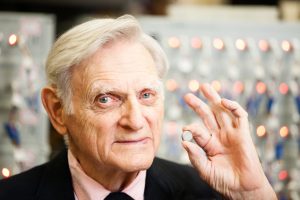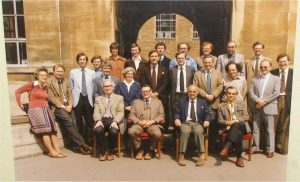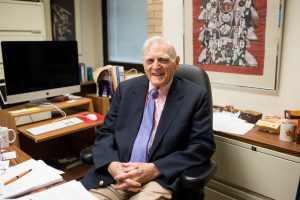Nobel laureate applauded Society “for convening the community to further scientific advancement”
Pennington, NJ – It is with deep sadness that The Electrochemical Society (ECS) announces the passing of our colleague and friend, Nobel laureate John B. Goodenough, on June 25, 2023. Throughout his career, John was a beloved member of the ECS community as a member, author, fellow, awardee, editor, meeting participant and organizer, and more.
“On behalf of the entire ECS community, I extend our deepest condolences on the passing of our esteemed member, John Goodenough,” said Gerardine Botte, ECS President. “His receiving the 2019 Nobel Prize in Chemistry (with fellow ECS members M. Stanley Whittingham and Akira Yoshino) ‘for the development of lithium-ion batteries,’ was fitting recognition for the truly groundbreaking advancements this pioneer made for our field and for the whole of humanity. His research is the enabling science upon which the solutions to the grand challenges facing the planet—renewable energy, clean transportation, communications, to name but a few—will be based.”
“At The Electrochemistry Society, we knew not just John Goodenough, the great scientist; we also knew the great man. It has been said that ‘Death ends a life, not a relationship.’ John lives on through the gift of his great discoveries—and through the generations of young scientists he taught, mentored, and promoted. His ECS publications will inspire generations to come,” said Christopher Jannuzzi, ECS Executive Director and Chief Executive Officer.
2019 Nobel Prize for Chemistry
John shared the 2019 Nobel Prize in Chemistry for the development of the lithium-ion battery with M. Stanley Whittingham and Akira Yoshino. The Royal Swedish Academy of Science’s “Scientific Background on the Nobel Prize in Chemistry 2019” cites John’s JES article, “Phospho-Olivines as Positive-Electrode Materials for Rechargeable Lithium Batteries,” as being particularly critical to the battery’s development. John’s publications with ECS are collected in 2019 Nobel Laureates in Chemistry.
His life, his science
In an ECS Masters Interview at the ECS PRiME 2016 Meeting, John discloses that as a child, he had dyslexia and could not read like others his age. He recounts leaving home at the age of 12 for an affluent boarding school as a struggling scholarship student. Life events that led him on the path of science and discovery, as well as the individuals who supported and guided him along the way, are described.
John Goodenough was born to American parents in Jena, Germany, in 1922. After studying mathematics at Yale University, he served during the Second World War as a meteorologist in the U.S. Army. He completed a PhD in Physics at the University of Chicago in 1952. While at the Massachusetts Institute of Technology Lincoln Laboratory, MA, from 1952 until 1976, he developed the SAGE air defense computer’s memory cores—the first random access memory (RAM). In 1976, he joined Oxford University, UK, as a professor and head of the Inorganic Chemistry Lab. There, in 1980, John improved on the first lithium-ion battery developed by M. Stanley Whittingham in 1976. Using a cathode of cobalt oxide, which, at a molecular level, has spaces that can house lithium ions, John produced a battery with a higher voltage than earlier batteries.
From 1986 until his death, he was a professor at the University of Texas at Austin in the Departments of Mechanical Engineering and Electrical and Computer Engineering. He held the Virginia H. Cockrell Centennial Chair of Engineering and continued working on lithium ion breakthrough technology, determined to make the batteries stronger, cheaper, and safer, and the world less dependent on fossil fuels.
During his life, John was honored as a member of the U.S. National Academies of Science and Engineering, and foreign member of the Royal Society, UK, and the National Societies of France, Spain, and India. Among the many awards John’s research garnered, he received the ECS Olin Palladium Award (1999), Japan Prize (2001), the Presidential Enrico Fermi Award (2009), the National Medal of Science (2012), and the Stark Draper Prize of the National Academy of Engineering (2014), and the Royal Society’s Copley Medal (2019). He is among the 2019 Class of Highly Cited Researchers. In 2008, The Royal Society of Chemistry, UK, created the John B Goodenough Award which recognizes exceptional and sustained contributions to the area of materials chemistry.
Goodenough and ECS
When asked in the Masters Interview about the dissemination of scientific content, John shares his belief that scholarly societies are essentially in the business of fostering partnerships to serve the community at large. He emphasizes the role of societies in creating space to convene the community to further scientific advancement.
John made some 45 ECS biannual meeting presentations between 1984 and 2019. Throughout his career, his articles appeared in the Journal of the Electrochemical Society, ECS Transactions, and Electrochemical and Solid-State Letters. Goodenough was awarded Honorary Membership in 2013 and recognized as a Fellow of the Electrochemical Society in 2016.In the spirit of John’s belief, the JES and JSS editorial teams came together to publish a focus issue comprised of 80+ select invited papers celebrating and honoring Goodenough’s life, legacy, and contributions as beloved professor and longtime ECS member. From Fundamentals to Next-Generation Technology – JES/JSS Focus Issue In Honor of John Goodenough: A Centenarian Milestone appeared two months before John’s 100th birthday.
The John B. Goodenough Award of The Electrochemical Society
ECS created the John B. Goodenough Award of The Electrochemical Society in 2022 to honor John’s unprecedented years of service to the scientific community which inspire us all. The first to receive the award was Professor Arumugam Manthiram, ECS Fellow and Lifetime Member, John’s close collaborator since 1985, who delivered John’s 2019 Chemistry Nobel Prize Lecture.
In a JES Editor’s Choice article, Prof. Manthiram described John’s unique personality and humanity—that exceptional character which so endeared him to the ECS community. “He always has a purpose. He is thoughtful and curious. He is a good listener with love and respect for everyone. He is humble, and always looks for learning from others, including any student, even at this age… He has a high moral standard. His philosophy is ‘always be honest about what you do and what you say, and leave the rest to the Lord.’ He is a role model to everyone not only in science, but also in our daily life. He is inspirational to everyone.”
The Electrochemistry Society (ECS)
The nonprofit professional Electrochemical Society has led the world in electrochemistry and solid state science and technology and allied subjects since 1902. We advance scientific theory and practice through publications, meetings, continuing education, and collaboration. Our robust global membership develops solutions to the planet’s major challenges. Scientists, engineers, and industry leaders share research at ECS biannual, co-hosted, and sponsored meetings. The ECS Digital Library on IOPscience hosts abstracts and highly peer-reviewed articles from publications, including the Journal of The Electrochemical Society (the oldest journal in its field), ECS Journal of Solid State Science and Technology, and new open access journals ECS Sensors Plus and ECS Advances.
Media Contact
The Electrochemical Society
Shannon Reed
Director of Community Relations
609.737.1902, Ext. 107
Shannon.Reed@electrochem.org




